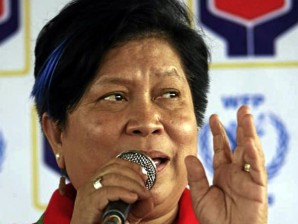DSWD mulls over extension of cash doles to high school students
BAGUIO CITY, Philippines—The Department of Social Welfare and Development is studying proposals to extend the government’s conditional cash transfer program to poor children aged 15 to 18 to encourage them to complete their high school education, Social Welfare Secretary Corazon Soliman said here on Friday.
The CCT provides poor families cash aid of P500 up to P900 for three children aged 1 to 14, provided they stay in school.
Each child who turns 14 automatically loses the P300 monthly stipend. Most children of that age are usually high school sophomores and are thus two years short of finishing the four-year high school term under the old program of the Department of Education.
But extending the age qualification of children under the CCT, officially called the Pantawid Pampamilyang Pilipino Program (4Ps), will face some objections, Soliman told Cordillera social workers at a consultation and dialogue here.
She said the DSWD spends the equivalent of 3 percent of the country’s GDP (gross domestic product) for the 4Ps every year.
Article continues after this advertisementNext year, the DSWD expects to operate with a P64-billion appropriation, of which P47 billion would be spent on the 4Ps, she said.
Article continues after this advertisement“I believe we are the only agency that has been called back three times [to the budget hearings of the House committee on appropriations]. There is much interest in [4Ps and how it is implemented],” Soliman said.
But when asked, Leonardo Reynoso, DSWD Cordillera director, said the implementation of DepEd’s K to 12 program could provide some justification for raising the age qualification of children under the 4Ps.
He said there were families whose children would begin elementary school in June and would be part of the first set of pupils under the K to 12 program.
The K to 12 program will replace the traditional 10-year basic education cycle by offering kindergarten and six years of elementary education, four years of junior high school education and two years of senior high school.
Social workers tasked to enforce the 4Ps have not left any detail to chance.
A report presented by the Cordillera DSWD to Soliman showed that social workers monitored each child’s progress in school and took notes on what textbooks were needed by beneficiaries.
In some schools, 4Ps-sponsored pupils went to class without textbooks, so the DSWD coordinated with the Department of Education to acquire more books or to photocopy them, the report said.
The government’s 4Ps serves 55,869 families in all towns in the Cordillera provinces of Abra, Apayao, Benguet, Ifugao, Kalinga and Mt. Province, as well as the cities of Tabuk (Kalinga) and Baguio.
Soliman said the DSWD was serving more than three million families of the total 5.2 million poor households validated by the National Household Targeting System.
The beneficiaries are expected to increase to 3.8 million within the next few months, she said. The DSWD Cordillera reported it had removed 3,898 beneficiaries since the program was launched in Abra in 2008.
“In Hungduan, Ifugao, for example, 10 household beneficiaries were removed from Pantawid Pamilya because they were found to have regular incomes. Some of these who were no longer eligible to receive cash grants from the government were teachers and businessmen,” a DSWD statement said.
